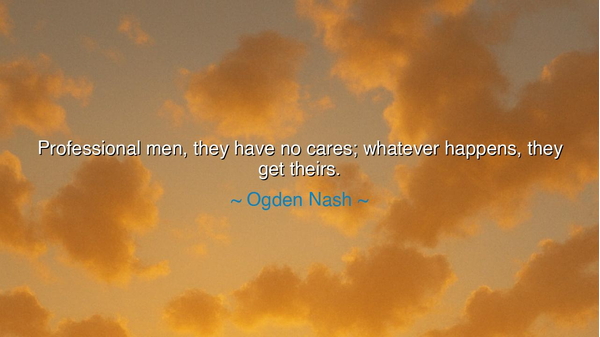
Professional men, they have no cares; whatever happens, they get






Gather, O children, and heed the words of Ogden Nash, whose wit and wisdom cut through the illusions of modern life. He said, "Professional men, they have no cares; whatever happens, they get theirs." These words, simple on the surface, hold a profound truth about the nature of success and security in society. Nash speaks not merely of men in a general sense, but of those who, through their profession or position, seem to be insulated from the trials and tribulations of life—the ones who, regardless of the world's chaos, are always guaranteed their due reward. This notion brings into sharp focus the contrast between those who hold power or prestige and those who toil without such guarantees.
Consider, O children, the age-old question of fate and fortune. In the ancient world, many believed that the gods favored certain individuals or families with blessings that could not be easily shaken. The pharaohs of Egypt, for instance, were seen not just as rulers but as divine figures chosen by the gods to wield absolute power and command prosperity. Their lives were ones of luxury and privilege, seemingly unaffected by the hardships that befell common people. Like Ogden Nash’s words, the pharaohs embodied the idea that those who hold certain titles and roles are often shielded from the struggles of ordinary existence, their fates already determined by their position in society.
In contrast, think of the common people—the farmers, the traders, the laborers—who lived under the shadow of the powerful, toiling day after day, with no guarantee of reward. Theirs was a life filled with uncertainty, with hardships that could wipe away their efforts in an instant. Socrates, the great philosopher, once said that "the unexamined life is not worth living." Yet for many in the ancient world, life itself was a constant examination of suffering and endurance. They worked hard, often without hope of relief, while the elite seemed untouched by such struggles. The idea that professional men get theirs regardless of the outcomes in life speaks to this very inequality—those born into privilege or those who hold positions of power often find themselves insulated from the uncertainties that the rest must face.
The words of Nash also echo through the lives of historical figures like Julius Caesar, who, though facing countless enemies and intrigues, never lacked for resources or support. His professional position as ruler of the Roman world afforded him the luxury of always having allies to call upon, soldiers to fight his battles, and wealth to sustain his ambitions. Yet, for those outside the circle of power, life was far less certain. For Caesar’s soldiers and those in his service, their fate was often tied to the whims of the emperor—if they pleased him, they were rewarded, but if not, their lives were at his mercy. In this, we see the stark contrast that Ogden Nash points out: the professional men, those in positions of power, live lives largely free of worry, while the rest are caught in a world of uncertainty.
Now, O children, let us reflect on the lesson hidden within Nash’s words. What does it mean to be one of these professional men who seemingly have no cares, who are shielded from the difficulties of life? Is it a matter of fortune or merit, of birth or of deeds? While it may be true that certain professions, particularly those tied to wealth or power, offer greater security, we must remember that no position is without its struggles. The true power lies not in the outward trappings of success, but in the inner strength to navigate adversity with grace and resolve.
The lesson, O children, is this: though some may appear untouched by the trials of life, it is often the very struggles and difficulties of our existence that shape us, that build character and wisdom. The professional men may have security and privilege, but it is those who face adversity, who rise despite the odds, that reveal the true strength of the human spirit. The world will always have its inequalities, but how we respond to those inequalities, how we adapt and grow, is what will define our lives.
So, O children, as you move through the world, do not envy those who seem to glide through life without cares. Recognize the privilege that is theirs, yes, but remember that it is often the struggles of life that forge the strongest souls. Let your own path be one of resilience, of rising up no matter the obstacles that come before you. In doing so, you will find that true strength and worth lie not in being untouched by hardship, but in how you meet it head-on and grow stronger because of it. The professional men may get theirs, but it is the ones who endure the most that earn the greatest reward.






AAdministratorAdministrator
Welcome, honored guests. Please leave a comment, we will respond soon